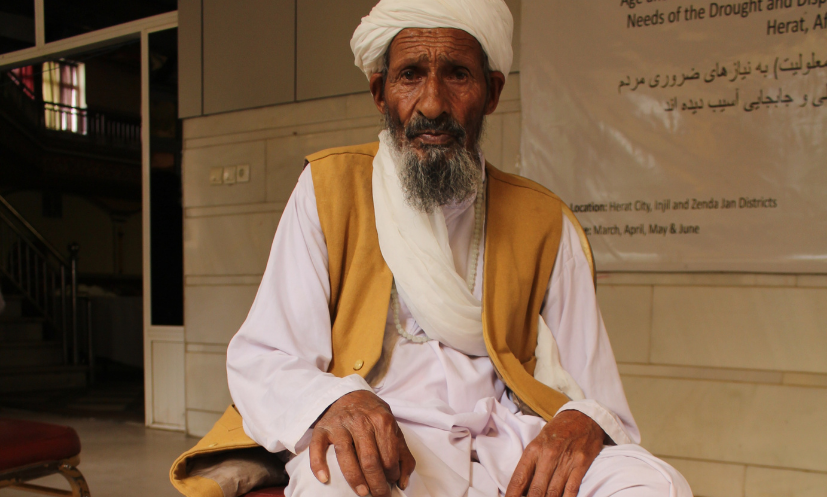‘The worst feeling is needing to eat but having no money for food’

Older people in Afghanistan are struggling to afford food and healthcare after decades of war, the impact of coronavirus and now an economic crisis and rising food and fuel prices. Thanks to donors to the DEC Afghanistan Crisis Appeal, 67-year-old grandfather Wakil was able to buy supplies and ensure his family is prepared for future hardship.
Wakil is from Herat province, Afghanistan and lives with his daughter-in-law and grandchildren in a small, 2-room home made of mud. His son had to leave to find work in Iran and sends payments to help cover their living expenses, but Wakil has not heard from him for some time. Wakil has limited mobility and cannot work, so without support from his son, he has no income.
“My biggest problem is that I cannot work or even go to the market to buy what my family needs. As we are living in a bad economic situation, my daughter-in-law wants to work outside the home, but our district’s customs and traditions don't allow her to do so.
When my son was unemployed, I could not find food because there was no money and the food prices were high. I prayed a lot that he would find a job and take care of our living expenses. Our living conditions were negatively affected by more than 95% after the Covid-19 outbreak. The worst feeling is needing to go to the market and eat but having no money to buy food.”
Getting healthcare treatment is also challenging for Wakil, as the local infrastructure is poor and the nearest clinic is some distance away by dirt roads. During the pandemic, doctors weren’t travelling to his village due to lockdowns and restrictions, but without funds or electricity for heating, they struggled to stay warm and healthy.
“The clinic is 8 km away and there must be someone to go to the clinic with me to get my treatment. We do not own any vehicles and the round-trip cost is high.
I was infected with Corona and I mostly treated myself at home. During the first winter of Covid-19, we ran out of fuel and food as we did not have money and could not afford it. Usually, there is no electricity in our village that we can use for electrical heaters. The possibility of getting sick therefore increased but there was no money to use to get the needed treatments.”
The situation in Afghanistan was further worsened by the economic collapse and political turmoil when the Taliban took power last year. The political unrest has stabilized somewhat, but living conditions are likely to worsen with the high rates of unemployment and the global cost-of-living crisis.
“Food and fuel are getting more expensive, especially gas. Now the security situation is decent, but unemployment has increased and that’s what pushed my son to travel to Iran with some neighbours to find job opportunities.”
Fortunately, with our partner in the region Humanity and Inclusion, we were able to support older people like Wakil to cover their living expenses.
“I was very happy with the assistance of your organisation. I could pay some outstanding debt, buy some food and start to stock the fuel for next winter. Most of the donated money was spent on buying rice, wheat and other groceries.
Without this assistance, we would not have been able to recover, and our debt burden would have increased with borrowers asking for more money and house assets. Thanks to this aid, I’ll be able to cover my family's needs for a while.
I am very happy I could get benefit from this assistance.”
Wakil knows not everyone is as lucky, and only wishes the situation in Afghanistan could improve, with better infrastructure and more opportunities for work.
“My wish for Afghanistan is to become a secure place where everyone can have a job and provide for themselves. In this way, we do not have to travel to Iran for work. I also wish that older people and persons with disabilities can always be supported and can access job opportunities to earn a safe income. May Allah increase the number of people like you, who help old people like me. God bless you."
